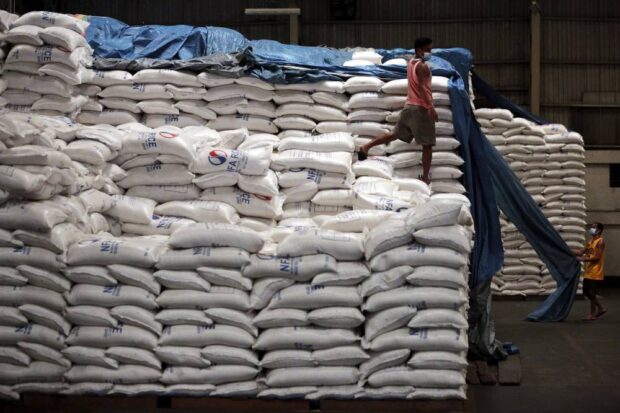
PROBE UNDERWAY | An investigation is underway into claims that National Food Authority officials sold tons of rice stocks without the usual bidding and at a loss to the government. (INQUIRER FILE PHOTO)
MANILA, Philippines — The Department of Agriculture (DA) has started an investigation into claims that officials of the National Food Authority (NFA) sold thousands of tons of rice to certain traders at a “disadvantageous” price to the government.
Agriculture Secretary Francisco Tiu Laurel Jr. has created a panel to review documents and hold interviews to establish the facts on the supposed sale of NFA rice stocks to unidentified traders without the usual bidding process.
According to the agriculture department, the rice stocks were sold at P25 per kilo when purchased as palay, at P23 per kilogram.
READ: Return of NFA rice for the poor eyed, but seen as tariffication failure
Agriculture Assistant Secretary Arnel de Mesa did not provide more information about the transactions nor identify the officials investigating the claim, but he clarified that Tiu Laurel wanted to establish the facts and determine whether there were really irregularities or the claims were spawned by bureaucratic intrigue.
“[The secretary] wants the truth to come out as soon as possible, what really happened. For all we know, this could only have stemmed from internal squabbles,” De Mesa said.
“Actually, there’s been a lot of finger-pointing inside and outside the NFA, so the secretary himself announced the investigation to bring out the truth,” he added.
On Tuesday, Tiu Laurel said the DA does not “brush aside reports of impropriety” against its officials, and any government agency is welcome “to conduct their own probe to ferret out the truth.”
He also warned that the “harshest penalty under the law” would be meted out to those who profit at the expense of farmers, fishers and consumers.
NFA’s explanation
“We are custodians of government funds — monies to be spent for the benefit of Filipinos, especially farmers and fisherfolk. Taxpayers’ money shouldn’t be squandered to line anybody’s pockets,” he said.
NFA Administrator Roderico Bioco, however, explained that the agency was allowed to dispose of aging stocks up to 10 percent lower than the mandated price (floor price of P22.50 per kg up to the maximum mandated ceiling price of P25 per kg) as well as damaged stocks for at least P6.50 per kg.
“The current NFA management was able to responsibly dispose [of] its rice stocks to government accounts by stretching to maximum shelf-life, minimizing the sale of residual volume to other accounts by implementing stricter guidelines and safeguards,” Bioco said in a statement posted on the People’s Television Network’s website on Wednesday.
He added that the NFA Council had been asked to raise the mandated maximum selling price for their old rice stocks because palay prices were much higher than their maximum price, making it difficult for the agency to increase or replace its buffer stock.
The NFA said the prevailing prices of clean and dry varieties ranged from P25 to P30 per kg as opposed to its buying price of P23 a kilo.
The agency is mandated to maintain an optimal rice inventory and dispose of it in case of emergencies and calamities under the Rice Tariffication Law. It can source palay only directly from local producers.
The NFA said it must keep and release 99.9 percent of its stocks in “good and consumable condition.”
As for the rice stocks sold, Bioco explained that while these were sold for P25 per kg, they still need to be remilled before they can be released to consumers.
Other programs
Moving forward, the NFA plans to implement a contract-growing scheme to require farmers who received seeds and fertilizer from the DA to sell 10 percent of their crop, up to 10 bags per hectare per year, at P23 per kg on a clean and dry basis.
The food agency is coordinating with the DA’s National Rice Program and the National Irrigation Administration to implement the program, which can generate at least 500,000 metric tons of palay for the NFA.